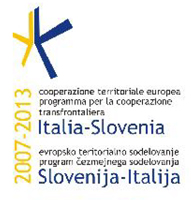State of the art
In accordance with the Operational Programme water resources represent a significant opportunity for cross-border cooperation when considering the importance of their monitoring in order to provide protection against hazards to the environment (pollution) and natural (floods). The swot analysis weaknesses are a low level of cooperation between the institutions providing public services (Irisacqua Gorizia and Nova Gorica Vodovodi in kanalizacija), the possibility of flooding and criticality on the state quantity and quality of surface and groundwater . This represents a great opportunity for a joint urban and regional planning with particular reference to the sustainable management of water resources for the prevention of natural and ecological risks and the consequent achievement of Community objectives.
Watersheds of the border town of Gorizia, Nova Gorica, empeter Vrtojba have in fact long been a complex and degraded state of the environment as evidenced by the Environmental Report of the Cross-border Cooperation Programme Italy-Slovenia 2007-2013. The pressure natural (floods), the cross-border area in question, even at long intervals (1681, 1703, 1890, 1935, 1983, 1987), involving a situation of immediate danger, not as efficient and appropriate containment measures current. Of great importance in the different hydraulic flow of the river Corno in the municipalities of Gorizia and Nova Gorica. Slovenian territory that runs on land in open channel, while the Italian territory is subject to funnel that leads him under the city of Gorizia. The limited capacity of the channel covered to collect the natural floods caused major flooding in the past on the Slovenian side.
Serious pollution problems arise from monitoring conducted in the past and studies conducted by the University of Udine and Nova Gorica which highlight the very critical environment ( pollution) of water bodies in question. Anthropogenic pressures are responsible for these long-standing problems that require immediate intervention. Surely aquatic ecosystems of interest altered by a continuous and never solved pollution reacted by establishing other states of equilibrium but are harmful to biological life. Environmental damage biological degenerates the quality of life as a whole and does not result in a suitable social usability of these goods so precious. The waterways of the Corno, together with the Vertojbica and Vipava, in the current state waters have poor quality and that, besides causing the damage mentioned above, also has a negative impact on the quality of what is connected to them and in particular on the quality the river Isonzo, called one of the most beautiful rivers in the world, losing important classes of quality in its path. This means, as well as a strong limitation for tourism and social populations, including major pollution and eutrophication in the Adriatic Sea where you enter.
Another opportunity is also the possibility of making better use of renewable resources for energy for a reduction of energy consumption (use of groundwater). But also the quality of groundwater is often unsatisfactory due to pollution (aquifer Vrtojba).
Lack of an adequate system of waste water treatment is another long-standing problems that if not resolved promptly increasingly affect the quality of surface water and groundwater. In fact, cross-border area of Gorizia and Nova Gorica sewerage is not appropriate to the needs of the two municipalities. ARPA investigations of Gorizia have highlighted some important critical issues in relation to microbiological contamination fecal and will also conduct studies on contamination farmaceuticals. Water quality decreases drastically from the point of entry of the river Corno, which conveys sewage unpurified of Nova Gorica, and collects some exhaust in the area north of Gorizia that can not be conveyed to the treatment plant as underestimated. Plans for a new sewage treatment plant in Nova Gorica and Gorizia optimization of treatment plant are ongoing and it is hoped that their completion shortly. In an optimal situation, it is possible to advocate an agricultural reuse of treated water, a re-use for the purpose of feeding areas of drought and promote renaturation, as well as a possible use of the sludges from the purified water as a soil improver in agriculture and for energy purposes. In conclusion, the quality status of surface and groundwater for the above reasons moves away from the objectives set by the European Framework Directive on water policy (2000/60/EC), which provides for the achievement of quality standards by 2015, as well as other policies Community instruments such as Directive 2006/44/EC of the European Parliament and of the Council on the quality of fresh water, which requires the protection or improvement in order to support fish life, and the sixth environment action program of the 'European Union (2001-2010). The area in question is therefore necessary to an adequate program for joint management of transboundary waters and integrated, in line with the operational program, which is able to prevent the ecological risks associated with natural and anthropogenic pressures thus allowing to overcome the long-standing issues cross-border management of water resources. |
